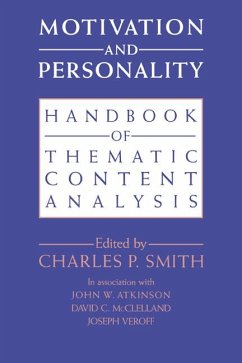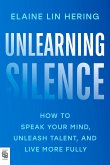Motivation and Personality is the first book to be devoted to content analysis systems for assessment of characteristics of the individuals, groups, or historical periods which create verbal materials. Manuals for using the various systems, research regarding the background of the systems and practice materials are included to create a book which is both a work of reference and a handbook.
Table of contents:
Preface; Acknowledgements; 1. Introduction: inferences from verbal material; Part I. General Issues: 2. Motivational determinants of thematic apperception; 3. How do self-attributed and implicit motives differ?; 4. Thematic analysis, experience sampling, and personal goals; 5. Motivational configurations; 6. Thematic apperceptive methods in survey research; 7. Content analysis of archival materials, personal documents, and everyday verbal productions; 8. Reliability issues; Part II. Content Analysis Systems: 9. The achievement motive; 10. A scoring manual for the achievement motive; 11. The motive to avoid success; 12. A revised scoring manual for the motive to avoid success; Part III. Afflilation: 13. The affiliation motive; 14. A scoring manual for the affiliation motive; 15. The intimacy motive; 16. The intimacy motivation scoring system; 17. Affiliative trust-mistrust; 18. A scoring system for affiliative trust-mistrust; Part IV. Power: 19. Power motivation; 20. A scoring manual for the power motive; 21. Power motivation revisited; 22. A revised scoring system for the power motive; Part V. Attribution and Cognitive Orientations: 23. Personal causation and the origin concept; 24. The origin scoring system; 25. Explanatory style; 26. The explanatory style scoring manual; 27. Conceptual/integrative complexity; 28. The conceptual/integrative complexity scoring manual; 29. Uncertainty orientation; 30. A manual for scoring need for uncertainty; Part VI. Psychosocial Orientations: 31. Assessing adaptation to life changes in terms of psychological stances toward the environment; 32. Scoring manual for psychological stances toward the environment; 33. Self-definition and social definition: personal styles reflected in narrative style; 34. Revised scoring manual for self-definition and social definition; 35. Responsibility; 36. Scoring system for responsibility; Part VII. Methodology, Scorer Training, Data Collection: 37. Methodological consideration: steps in research employing content analysis systems; Appendixes; References; Indexes.
This is the first book to be devoted primarily to content analysis systems for assessing the characteristics of the individuals, groups, or historical periods which create verbal materials. Manuals for using the systems and research into their background are included, making this both a work of reference and a handbook.
The first book to be devoted primarily to content analysis systems for assessing the creation of verbal materials.
Hinweis: Dieser Artikel kann nur an eine deutsche Lieferadresse ausgeliefert werden.
Table of contents:
Preface; Acknowledgements; 1. Introduction: inferences from verbal material; Part I. General Issues: 2. Motivational determinants of thematic apperception; 3. How do self-attributed and implicit motives differ?; 4. Thematic analysis, experience sampling, and personal goals; 5. Motivational configurations; 6. Thematic apperceptive methods in survey research; 7. Content analysis of archival materials, personal documents, and everyday verbal productions; 8. Reliability issues; Part II. Content Analysis Systems: 9. The achievement motive; 10. A scoring manual for the achievement motive; 11. The motive to avoid success; 12. A revised scoring manual for the motive to avoid success; Part III. Afflilation: 13. The affiliation motive; 14. A scoring manual for the affiliation motive; 15. The intimacy motive; 16. The intimacy motivation scoring system; 17. Affiliative trust-mistrust; 18. A scoring system for affiliative trust-mistrust; Part IV. Power: 19. Power motivation; 20. A scoring manual for the power motive; 21. Power motivation revisited; 22. A revised scoring system for the power motive; Part V. Attribution and Cognitive Orientations: 23. Personal causation and the origin concept; 24. The origin scoring system; 25. Explanatory style; 26. The explanatory style scoring manual; 27. Conceptual/integrative complexity; 28. The conceptual/integrative complexity scoring manual; 29. Uncertainty orientation; 30. A manual for scoring need for uncertainty; Part VI. Psychosocial Orientations: 31. Assessing adaptation to life changes in terms of psychological stances toward the environment; 32. Scoring manual for psychological stances toward the environment; 33. Self-definition and social definition: personal styles reflected in narrative style; 34. Revised scoring manual for self-definition and social definition; 35. Responsibility; 36. Scoring system for responsibility; Part VII. Methodology, Scorer Training, Data Collection: 37. Methodological consideration: steps in research employing content analysis systems; Appendixes; References; Indexes.
This is the first book to be devoted primarily to content analysis systems for assessing the characteristics of the individuals, groups, or historical periods which create verbal materials. Manuals for using the systems and research into their background are included, making this both a work of reference and a handbook.
The first book to be devoted primarily to content analysis systems for assessing the creation of verbal materials.
Hinweis: Dieser Artikel kann nur an eine deutsche Lieferadresse ausgeliefert werden.








